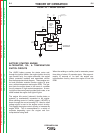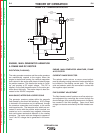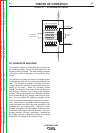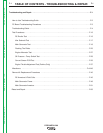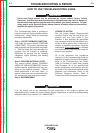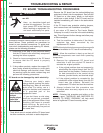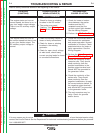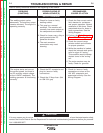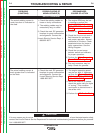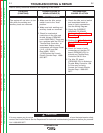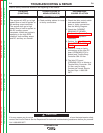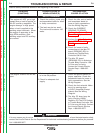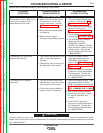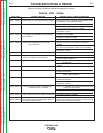
OUTPUT PROBLEMS
Observe Safety Guidelines detailed in the beginning of this manual.
PROBLEMS
(SYMPTOMS)
POSSIBLE AREAS OF
MISADJUSTMENT(S)
RECOMMENDED
COURSE OF ACTION
If for any reason you do not understand the test procedures or are unable to perform the tests/repairs safely,
contact the Lincoln Electric Service Department for technical troubleshooting assistance before you proceed.
Call 1-888-935-3877.
CAUTION
The welding output varies
abnormally. The auxiliary output
remains constant. The engine is
operating correctly.
1. Check for loose or faulty
welding cables.
2. This may be a normal
condition. The machine will
normally lose some output as
the components are heated.
3. Check for loose, worn, dirty or
poorly seated main DC
generator brushes.
4. The main armature
commutator may need
cleaning.
1. Check the fine current control
field rheostat for resistance
and proper operation. Normal
resistance is 64 ohms. Check
associated wires for loose or
faulty connections. See the
Wiring Diagram.
2. Perform the Main Generator
Shunt Field Winding Test.
3. Check the current range
selector switch and contacts
for proper operation.
4. While the machine is loaded,
check the interpole and series
coils for signs of “arcing.”
This condition would indicate
shorted turns in the “arcing”
coil.
5. The main armature may be
faulty. Check for grounds.
The engine starts and runs at
the correct speed, but there is
no DC auxiliary output voltage
at the 115VDC receptacle. The
welding generator is functioning
correctly.
1. Check the DC receptacle and
plug for loose or faulty
connections.
2. Check the 15 Amp fuse. (Not
on GM 3.0L gas)
1. Check for loose or faulty
connections or wires at the
120 VDC receptacle and
associated circuitry. See the
Wiring Diagram.
TROUBLESHOOTING & REPAIR
F-5 F-5
PIPELINER® 200
Return to Section TOC Return to Section TOC Return to Section TOC Return to Section TOC
Return to Master TOC Return to Master TOC Return to Master TOC Return to Master TOC



